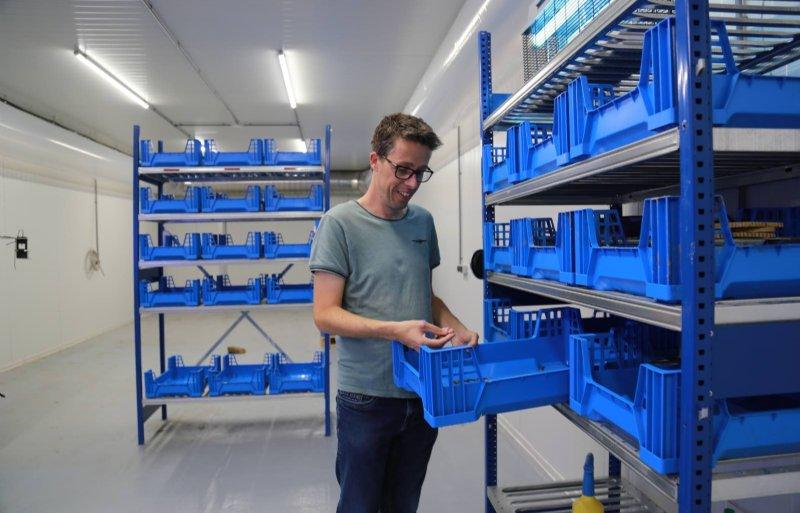There is great interest from home and abroad when the doors of the Insect School open in Limburg's America at the end of June. Initiator Bob Holtermans wants to share knowledge and facilitate practical trials in a market that is as closed as it is promising.

Photo: © Michiel Elands
The Netherlands is one of the pioneers in global insect farming. Besides start-ups and large companies, more and more livestock farmers are starting to produce crickets, grasshoppers, mealworms or black soldier flies (Black Soldier Flies). The insects are suitable for animal feed or human consumption, often first being processed into flour or oil.
The European Union sees insect farming as an important link in the continent's protein transition, and large investors are stepping into the market. In this playing field, entrepreneur Bob Holtermans (39) is trying to carve out his niche. He started the company Insect Engineers in 2019 to facilitate entrepreneurs from a to z in the cultivation of black soldier flies.
The grower says he stepped into the gap between education with small pilot sites like HAS University and large companies like Protix that keep their breeding methods secret. 'At the Insect School, sharing knowledge is paramount. That is necessary to grow the market. You need a certain scale to do experiments that really connect to practice. Through this route we want to make insect cultivation commercially attractive.'
"It is wise to start small to get the hang of cultivation"
28 degrees Celsius
28 degrees Celsius
On a former mushroom farm, Holtermans set up four rooms for insect cultivation. In three rooms there is also a climate unit to get the right temperature for the production of the black soldier flies. This is 28 degrees Celsius at a humidity level of about 70 percent. Extensive tests are done throughout the production process, such as which residual streams are suitable for the larvae to grow on.
Photo: the production of black soldier flies in practice. © Michiel Elands
The production process starts with the eggs and young larvae, or breeding. Then the fattening of the larvae starts and as a final step the insects are killed and processed into oil or flour. In a commercial insect farm, we assume nine production cells or a multiple thereof. The production process, which lasts nine days, thus provides a constant outlet.'
Holtermans himself is the son of a mushroom grower and insect cultivation has strong similarities with mushroom production. The larvae of the Black Soldier Flies grow on large beds on a substrate in a climate cell.
'My father started a company to overhaul and produce the machines for mushroom cultivation. One of the machines is for filling the beds with substrate. You also need these to make insect cultivation profitable. For both mushroom farms and insect farms, it's customization. After all, you can produce different insects and on different substrates.'
Toilets slums
The grower came into contact with insect farming by chance. About five years ago, he was approached by Sanergy in Kenya. In the slums of the capital Nairobi, this organization supplies toilets for the residents. The human manure flows are then processed by Black Soldier Flies into organic fertilizer. On an annual basis, this involves the processing of some 73,000 tons of human manure flows, and the company from North Limburg supplies the machines, racks and cultivation boxes for the production process.
Insects can serve perfectly as food for humans as a meat substitute or for pigs and chickens as a substitute for soy. Because consumption is still barely established and legislation is putting barriers in the way, Holtermans now sees most opportunities in processing residual streams. 'And then of course the low-grade residual flows that we cannot use as food.'
At the Insect School, trials were done with pig manure and orange peels as substrate and they proved successful. 'This also gives rise to different earning models, where you don't necessarily go for the highest production, but for example convert a cost item like manure into an organic soil improver that makes money' says the grower.
Closed-loop agriculture
According to Wageningen University & Research and the United Dutch Insect Growers, insect cultivation will be an indispensable link in circular agriculture by 2030. Insects require little space during production and grow quickly. The proteins and fats from insects are sold worldwide. Holtermans will also receive visitors from home and abroad during the opening week of the Insect School.
He sees it as an opportunity for farmers and market gardeners to switch to insect cultivation, but he feels it is unsuitable as a small sideline. Ultimately you need scale in a market where the cost price is so dominant. It requires specific knowledge and enough hands for the daily work. It is also wise to start small in order to get the hang of cultivation. Practical experience can be gained at our location.'
Shredded marketing
One of the hot topics is sales that are fragmented in this global startup phase. The entrepreneur does think that given the large parties interested, the market will explode in about five years. 'What you don't hear much about is that because of the small ecological footprint of insect cultivation, companies can go green. For example, it could be interesting for oil giants to make their operations more sustainable through large-scale cultivation.'
This article was taken from newharvest